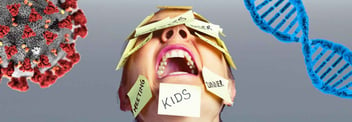How to Tame your “Stress Genes” for Better Mental Health
- Home
- Blog

Reader, we are now just about two years into the pandemic–and with the new Omicron variant, the world as we know it likely won’t return to normal any time soon. Never before in memory has there been such a collective, prolonged unease. With that in mind, let me ask you a question: How are you doing?
If you’re not doing so well, please know that you are not alone. According to one APA study, in February of 2021 nearly 80% of adults reported emotions associated with prolonged stress! With chronic levels of stress at an all-time high and showing no signs of relenting, the question many seek to answer is: How can I cope?
As it turns out, the issue is not environmental stress per se, it is how we respond to that stress, our so-called "stress-response." Understanding our underlying genetic code can help us determine the biological component of our stress-response, and how to better manage it. From there, our “stress-response genes” can enable us to pinpoint coping mechanisms tailored to our biological needs. In this blog, we’ll review some of those stress-response genes and explain how you can start solving the problem of your chronic stress today.
What Causes Our Stress-Response Genes to Stress Us Out?
Over the eons, we humans evolved important biological systems to “buffer” our cells against various environmental stressors and promote homeostasis within the body. One such system is known as our fight or flight response. Mediated by hormones from our adrenal glands, including cortisol and adrenaline, this system rapidly enables us to fight off immediate threats by boosting our heart rate, mitochondrial energy production, immunity, and muscle strength.
In the modern world, these sudden stressors have largely been replaced by chronic stressors which frequently “overload” our stress response systems. This results in chronic inflammation and many other chronic diseases including obesity, autoimmunity, and more.
Certain genetic variants predispose us to the debilitating effects of chronic stress–and the more we understand them, the more we can intervene as necessary to make sure unremitting stress does not destroy our health. At Potomac Psychiatry we use genetic testing to test for these variants, through a simple cheek swab.
Six Stress-Response Genes and How To Address Them
The following genes each play a role in how you handle stress. I encourage you to follow the links below to learn more about each gene and the role it plays in your overall functioning:
- SLC6A4: Those who possess an S/S or L(G)/S variant on their SLC6A4 gene can suffer from an over-activation of the amygdala–the emotional center of the brain–when chronically stressed, and are less able to process these strong emotions. For this reason, these variants are known as “orchid” variants, as individuals who possess them may require more nurturing environments in order to thrive. Those with orchid variants can benefit from a change in environment when overly stressed. Certain prescription medications may also be helpful.
- COMT: The COMT Met/Met gene is another orchid variant. Those who possess this variant suffer from flooding of the brain’s frontal lobes with dopamine when placed under chronic stress, and are less able to process strong emotions when overwhelmed. Potential treatments include ashwagandha, magnesium, and some prescriptions.
- BDNF: Those who possess a BDNF Val/Met or Met/Met orchid gene suffer from a “withering of the brain” in response to chronic stress as proteins of BDNF, the brain’s “fertilizer”, drop. Brain cells are less protected from inflammation resulting from the wear and tear of chronic stress, leading to emotional and cognitive malfunction over time. Treatments include exercise, high dose omega 3s, and lithium.
- OXTR: Oxytocin is the brain’s “comfort food” hormone. In response to chronic stress, it can boost your emotional resilience. Depending on your OXTR variant, you may bolster your oxytocin levels by increasing your social connection with others, or being prescribed oxytocin nasal spray.
- FKBP5 and CRHR1: If you have a T allele on your FKBP5 gene or a G allele on your CRHR1 gene, you may be prone to “adrenal gland overload” - an elevated and prolonged cortisol response to stress. Lifestyle changes can help you regulate and decrease your stress response. These include meditation, exercise, Vitamin D, St. John’s Wort, and more.
Taking Charge of Your Stress Genes
The pandemic has been stressful for many of us. But if you are feeling especially overwhelmed, I encourage you to reach out to a mental health professional at Potomac Psychiatry to learn more about the genetics behind your stress response and to begin to take charge of your health.
.png?width=144&height=144&name=Untitled%20design%20(34).png)



